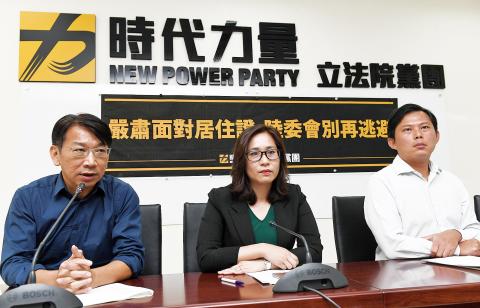The New Power Party (NPP) yesterday slammed the Mainland Affairs Council for its “near incompetence” regarding China’s new measure to issue residency cards to Taiwanese and called for more concrete countermeasures from the Taiwanese government.
“Although China unveiled the measure well before last week, the council did not state any plans to counter it until the party [on Tuesday] last week advocated amending the Act Governing Relations Between the People of the Taiwan Area and the Mainland Area (台灣地區與大陸地區人民關係條例) so that card holders would be treated the same as those with household registration in China by requiring them to report to the Taiwanese government,” NPP Legislator and party caucus whip Hsu Yung-ming (徐永明) told a news conference in Taipei.
Although the council finally announced on Thursday last week that card holders would be required to report to the authorities, it has yet to decide whether to suspend or cancel card holders’ household registration in Taiwan, he said.

Photo: CNA
A tougher approach and more concrete countermeasures from the government would not restrict the rights of Taiwanese living in China, but rather “offer them more bargaining chips when negotiating with Chinese authorities and prevent them from being pressured into applying for the card,” he added.
The council’s attitude toward China has been “not only timid, but nearly incompetent,” NPP Executive Chairman Huang Kuo-chang (黃國昌) said.
“Taiwanese have all been wondering what the council and the Straits Exchange Foundation have been doing. If they cannot propose any concrete countermeasures, we might as well get the Executive Yuan to put them under the Ministry of Foreign Affairs,” he said.
Hsu said the party would be meeting with Mainland Affairs Council Minister Chen Ming-tong (陳明通) to get an idea of how many Taiwanese have applied for the card, whether Taiwanese have been forced to apply — and, if so, who are more likely to be pressured — and how the council plans to respond to China, adding that the party would share what it learns at the meeting with the public.
While Democratic Progressive Party Legislator Wang Ding-yu (王定宇) plans to propose a draft amendment similar to the NPP bill, Hsu said he hopes that other DPP members would also support the effort.
The Chinese State Council Information Office announced on Aug. 16 that from this month, Taiwanese, Hong Kongers and Macanese who have lived in China for more than six months and are legally working, living or studying in the country would be eligible to apply for a residency card.
Card holders would be granted certain rights and benefits enjoyed by Chinese citizens, such as compulsory education, social insurance and housing subsidies.

CHAOS: Iranians took to the streets playing celebratory music after reports of Khamenei’s death on Saturday, while mourners also gathered in Tehran yesterday Iranian Supreme Leader Ayatollah Ali Khamenei was killed in a major attack on Iran launched by Israel and the US, throwing the future of the Islamic republic into doubt and raising the risk of regional instability. Iranian state television and the state-run IRNA news agency announced the 86-year-old’s death early yesterday. US President Donald Trump said it gave Iranians their “greatest chance” to “take back” their country. The announcements came after a joint US and Israeli aerial bombardment that targeted Iranian military and governmental sites. Trump said the “heavy and pinpoint bombing” would continue through the week or as long

TRUST: The KMT said it respected the US’ timing and considerations, and hoped it would continue to honor its commitments to helping Taiwan bolster its defenses and deterrence US President Donald Trump is delaying a multibillion-dollar arms sale to Taiwan to ensure his visit to Beijing is successful, a New York Times report said. The weapons sales package has stalled in the US Department of State, the report said, citing US officials it did not identify. The White House has told agencies not to push forward ahead of Trump’s meeting with Chinese President Xi Jinping (習近平), it said. The two last month held a phone call to discuss trade and geopolitical flashpoints ahead of the summit. Xi raised the Taiwan issue and urged the US to handle arms sales to

State-run CPC Corp, Taiwan (CPC, 台灣中油) yesterday said that it had confirmed on Saturday night with its liquefied natural gas (LNG) and crude oil suppliers that shipments are proceeding as scheduled and that domestic supplies remain unaffected. The CPC yesterday announced the gasoline and diesel prices will rise by NT$0.2 and NT$0.4 per liter, respectively, starting Monday, citing Middle East tensions and blizzards in the eastern United States. CPC also iterated it has been reducing the proportion of crude oil imports from the Middle East and diversifying its supply sources in the past few years in response to geopolitical risks, expanding

OTHER OPTIONS: Given possible US intervention and Taiwanese counterattacks, China might opt to blockade Taiwan or take its outlying islands instead of an all-out invasion A US think tank has urged Taiwan to adopt a “hellscape” strategy that would flood the Taiwan Strait with drones and other uncrewed systems to deter invasion by China. In its report, Hellscape for Taiwan, published on Thursday, the Center for a New American Security said Taipei’s asymmetric defense approach — often described as a “porcupine strategy” — needs to evolve to keep pace with the growing capabilities of the Chinese People’s Liberation Army. The “hellscape” strategy involves saturating the air and waters around Taiwan with thousands of drones and other platforms capable of striking invading forces from multiple domains at once. Long-range